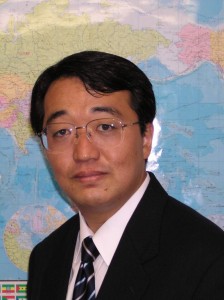緊張と統合:内村鑑三におけるキリスト教と日本の精神
このシリーズでは、私が1994年に執筆した統一神学大学院(Unification Theological Seminary)の神学課程修士論文(Divinity Thesis)を日英二か国語で掲載している。
6.無教会と日本社会の続き
日本基督教団は、しばしば日本の戦後のキリスト教徒から、第二次大戦中に歴史を読み誤ったと批判される。すなわち権力に順応し、その暴力と残虐行為を宗教的な言葉をもって正当化しようとしたと非難されるのである。たとえばそれはアジアの教会に『日本基督教団より大東亜共栄圏に在る基督教徒に送る書翰』という手紙を送っており、それは日本の軍事的拡大を歴史の進歩であると解釈し、神の意志であるとして正当化しているのである。
戦争中は、全ての宗教的グループが思想的な武器として政府に利用された。全般的に見て、日本のキリスト教は満州事変の時に政府を支持した。さらに、日本のキリスト教は日本政府による韓国キリスト教へのむごたらしい弾圧に対して、何の抗議もしなかった。彼らは韓国教会と苦しみを共にすることが出来なかったのである。
しかしながら、1930年代および40年代の異常なまでのナショナリズムに屈しなかったキリスト者もいたのである。その中の一人が矢内原忠雄である。彼は内村の弟子であり、無教会運動の指導者の一人でもあった。彼は満州事変の時に勇気をもって軍国主義を批判し、そのことの故に彼は東京帝国大学の教授としての位置を退かなければならなくなった。彼は内村の預言者的精神を相続し、イザヤの託宣に基づいて国に対する警告を発したのである。
第二次世界大戦の終結と連合国の日本占領により、全面的な信教の自由が日本にもたらされた。悪名高い宗教団体法の廃止は、宗教界に根本的な変化をもたらした。信教の自由と、宗教と国家の分離を保証され、全ての宗教グループは精力的な活動を開始した。それはキリスト教にとっても新しい出発をなす絶好のチャンスであった。しかしながら、日本基督教団は戦争中の御都合主義を深く悔い改めることが出来ず、教会の指導者達は戦争責任を回避しようとしたのである。それは現在に至るまで継続されている課題であり、一般社会においても状況は同様である。
VI. Mukyokai and Japanese Society. (Cont.)
The Kyodan (the Church of Christ in Japan) is often criticized by the postwar Japanese Christians for its misleading of history during World War II. It is accused of accommodating itself to ruling power and tried to rationalize in religious terms the violence and atrocities of that power. For example, it sent a letter to Asian churches – “An Open Letter from the Nippon Kirisuto Kyodan to All Christians in the Greater East Asia Co-prosperity Sphere” – that interpreted Japan’s military expansion as history’s progress and justified it as God’s will.(38)
During the war all religious groups were exploited by the government as ideological weapons. In general, Japanese Christians supported the government at the time of the Manchurian adventure.(39) Furthermore, Japanese Christianity did not offer any protest against the cruel oppression of Korean Christianity by the Japanese government; they could not share suffering with Korean churches.(40)
However, there were some Christians who did not surrender to the exaggerated nationalism of the 1930’s and 1940’s. One of them was Tadao Yanaihara, who was a disciple of Uchimura and a leading figure of the Non-church movement. He courageously criticized militarism at the time of the Manchurian Incident, that led to his resignation of his post as professor at the Tokyo Imperial University. He inherited the prophetic spirit of Uchimura, and based his warning to the nation on the oracle of Isaiah.(41)
The end of World War II and the Allied occupation of Japan brought full-scale religious freedom to Japan. The abrogation of the ill-famed Religious Organizations Law also radically altered the religious scene. Assured of religious freedom and separation of religion and state by the Religious Ordinance, all religious groups began energetic activities. It was a good chance for Christianity to make a fresh start. However, the Church of Christ in Japan could not repent deeply enough of its opportunism during the war. The church leaders tried to avoid responsibility for the war.(42) It is still an ongoing problem, the same as in the general society.
(38)Tsutomu Shoji, “The United Church of Christ in Japan: Its Sin and Rebirth” in Mid-Stream 27, (April 1988), p.168.
(39)op cit, Latourette, Vol.7, p.396.
(40)op cit, Ebisawa and Ouchi, p.561.
(41)Ibid., p.594-600.
(42)Ibid., p.611-614.
